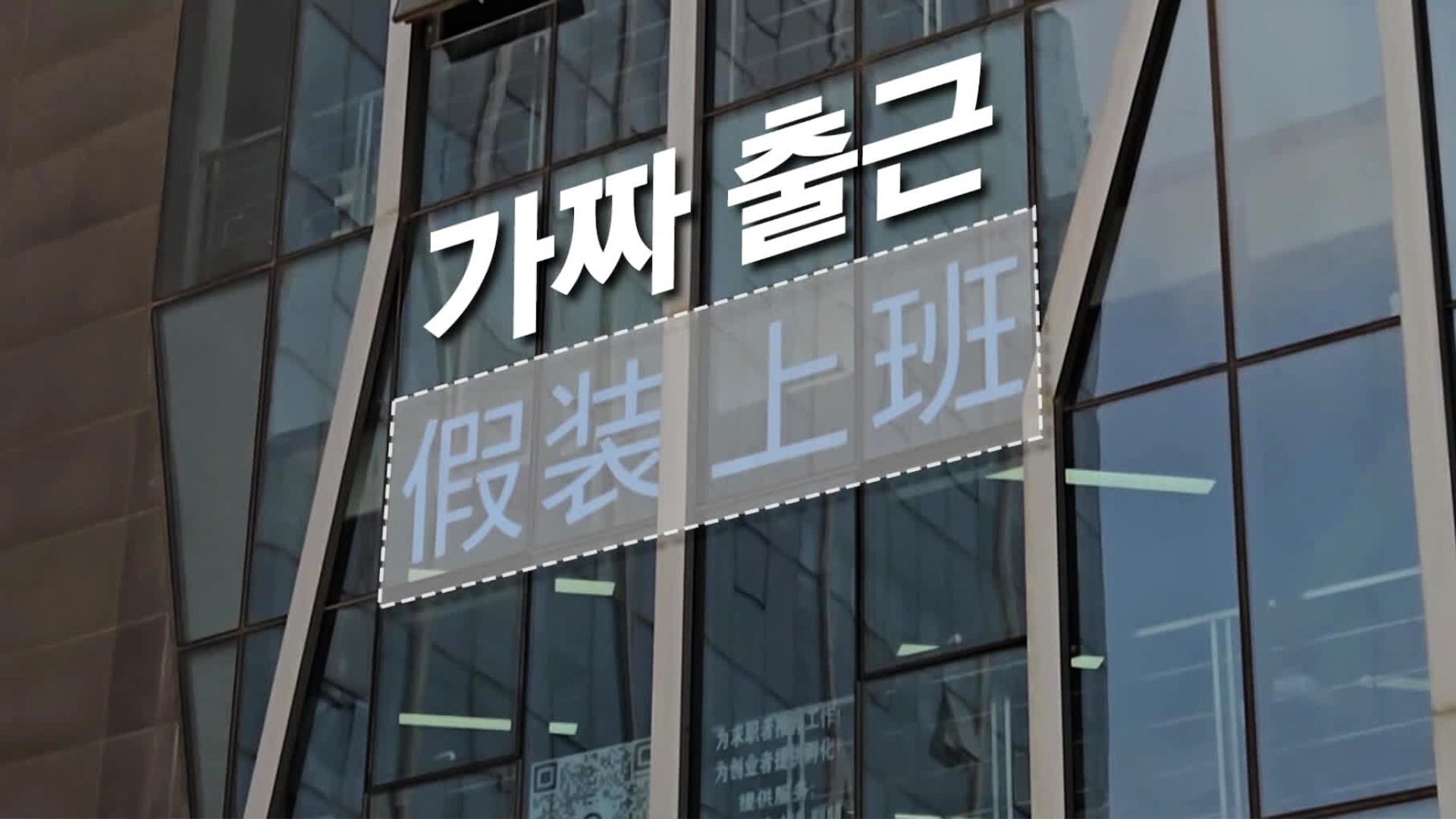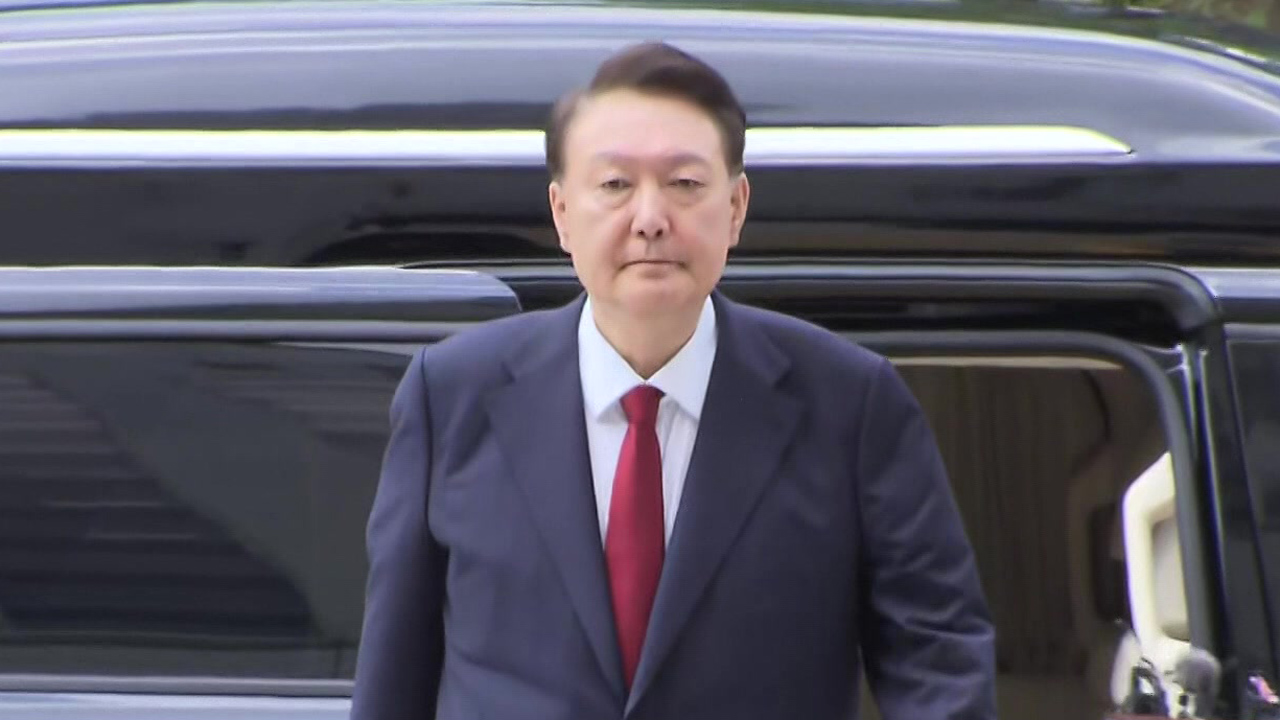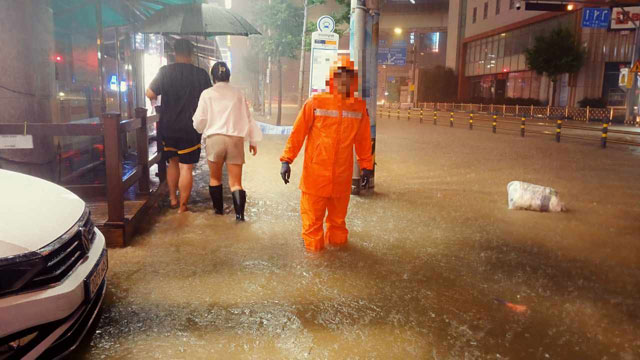[Anchor]
Meeting, receiving work instructions, and sometimes facing reprimands.
This is the typical day of an office worker.
It turns out these individuals are fake office workers who do not receive a salary, and instead, pay to show up.
A new phenomenon known as fake commuting is spreading across China.
Our Beijing correspondent Kim Hyo-shin looked into why this is happening.
[Report]
This is an office building in the city of Zhuhai, China, where offices are densely packed.
People appear to be attending meetings or receiving instructions from supervisors.
But in reality, this is a fake company that helps people pose as employed.
Job seekers, who are facing judgment from family and friends, can pay a fee to use this service.
At some fake companies, paying more even lets you choose your job title, like CEO or manager.
[Fake company employee: "(Which department would you like? I am the CEO.) What position can I get with 30 yuan (about 6,000 won)?"]
These fake companies often utilize offices that are vacant due to the real estate slump, and the usage fee is only a few thousand won per day.
Recently, such companies have been popping up across China.
Behind this bizzare trend is a tough job market.
This summer, a record 12 million college graduates are entering the job market in China, a 3.6% increase from last year.
However, job openings in the second half of the year is expected to grow by only half of that.
['Fake company' user: "I think we need a place like this to get out of unemployment. Here, we can do our own work and also connect with others."]
On top of that, 15% of last year's graduates are still unemployed.
The saying "graduation equals unemployment" is increasingly becoming a reality.
[This year's graduate: "I'm trying to find a job, but I'm being rejected everywhere, so I'm wandering the streets. (Oh, that's so miserable.)"]
In response, Chinese authorities have even rolled out emergency measures, including one-time subsidies for companies that hire young, unemployed workers.
This is Kim Hyo-shin from KBS News in Beijing.
Meeting, receiving work instructions, and sometimes facing reprimands.
This is the typical day of an office worker.
It turns out these individuals are fake office workers who do not receive a salary, and instead, pay to show up.
A new phenomenon known as fake commuting is spreading across China.
Our Beijing correspondent Kim Hyo-shin looked into why this is happening.
[Report]
This is an office building in the city of Zhuhai, China, where offices are densely packed.
People appear to be attending meetings or receiving instructions from supervisors.
But in reality, this is a fake company that helps people pose as employed.
Job seekers, who are facing judgment from family and friends, can pay a fee to use this service.
At some fake companies, paying more even lets you choose your job title, like CEO or manager.
[Fake company employee: "(Which department would you like? I am the CEO.) What position can I get with 30 yuan (about 6,000 won)?"]
These fake companies often utilize offices that are vacant due to the real estate slump, and the usage fee is only a few thousand won per day.
Recently, such companies have been popping up across China.
Behind this bizzare trend is a tough job market.
This summer, a record 12 million college graduates are entering the job market in China, a 3.6% increase from last year.
However, job openings in the second half of the year is expected to grow by only half of that.
['Fake company' user: "I think we need a place like this to get out of unemployment. Here, we can do our own work and also connect with others."]
On top of that, 15% of last year's graduates are still unemployed.
The saying "graduation equals unemployment" is increasingly becoming a reality.
[This year's graduate: "I'm trying to find a job, but I'm being rejected everywhere, so I'm wandering the streets. (Oh, that's so miserable.)"]
In response, Chinese authorities have even rolled out emergency measures, including one-time subsidies for companies that hire young, unemployed workers.
This is Kim Hyo-shin from KBS News in Beijing.
■ 제보하기
▷ 카카오톡 : 'KBS제보' 검색, 채널 추가
▷ 전화 : 02-781-1234, 4444
▷ 이메일 : kbs1234@kbs.co.kr
▷ 유튜브, 네이버, 카카오에서도 KBS뉴스를 구독해주세요!
- “Fake employment” trend in China
-
- 입력 2025-07-14 01:01:43

[Anchor]
Meeting, receiving work instructions, and sometimes facing reprimands.
This is the typical day of an office worker.
It turns out these individuals are fake office workers who do not receive a salary, and instead, pay to show up.
A new phenomenon known as fake commuting is spreading across China.
Our Beijing correspondent Kim Hyo-shin looked into why this is happening.
[Report]
This is an office building in the city of Zhuhai, China, where offices are densely packed.
People appear to be attending meetings or receiving instructions from supervisors.
But in reality, this is a fake company that helps people pose as employed.
Job seekers, who are facing judgment from family and friends, can pay a fee to use this service.
At some fake companies, paying more even lets you choose your job title, like CEO or manager.
[Fake company employee: "(Which department would you like? I am the CEO.) What position can I get with 30 yuan (about 6,000 won)?"]
These fake companies often utilize offices that are vacant due to the real estate slump, and the usage fee is only a few thousand won per day.
Recently, such companies have been popping up across China.
Behind this bizzare trend is a tough job market.
This summer, a record 12 million college graduates are entering the job market in China, a 3.6% increase from last year.
However, job openings in the second half of the year is expected to grow by only half of that.
['Fake company' user: "I think we need a place like this to get out of unemployment. Here, we can do our own work and also connect with others."]
On top of that, 15% of last year's graduates are still unemployed.
The saying "graduation equals unemployment" is increasingly becoming a reality.
[This year's graduate: "I'm trying to find a job, but I'm being rejected everywhere, so I'm wandering the streets. (Oh, that's so miserable.)"]
In response, Chinese authorities have even rolled out emergency measures, including one-time subsidies for companies that hire young, unemployed workers.
This is Kim Hyo-shin from KBS News in Beijing.
Meeting, receiving work instructions, and sometimes facing reprimands.
This is the typical day of an office worker.
It turns out these individuals are fake office workers who do not receive a salary, and instead, pay to show up.
A new phenomenon known as fake commuting is spreading across China.
Our Beijing correspondent Kim Hyo-shin looked into why this is happening.
[Report]
This is an office building in the city of Zhuhai, China, where offices are densely packed.
People appear to be attending meetings or receiving instructions from supervisors.
But in reality, this is a fake company that helps people pose as employed.
Job seekers, who are facing judgment from family and friends, can pay a fee to use this service.
At some fake companies, paying more even lets you choose your job title, like CEO or manager.
[Fake company employee: "(Which department would you like? I am the CEO.) What position can I get with 30 yuan (about 6,000 won)?"]
These fake companies often utilize offices that are vacant due to the real estate slump, and the usage fee is only a few thousand won per day.
Recently, such companies have been popping up across China.
Behind this bizzare trend is a tough job market.
This summer, a record 12 million college graduates are entering the job market in China, a 3.6% increase from last year.
However, job openings in the second half of the year is expected to grow by only half of that.
['Fake company' user: "I think we need a place like this to get out of unemployment. Here, we can do our own work and also connect with others."]
On top of that, 15% of last year's graduates are still unemployed.
The saying "graduation equals unemployment" is increasingly becoming a reality.
[This year's graduate: "I'm trying to find a job, but I'm being rejected everywhere, so I'm wandering the streets. (Oh, that's so miserable.)"]
In response, Chinese authorities have even rolled out emergency measures, including one-time subsidies for companies that hire young, unemployed workers.
This is Kim Hyo-shin from KBS News in Beijing.
-
-

김효신 기자 shiny33@kbs.co.kr
김효신 기자의 기사 모음
-
이 기사가 좋으셨다면
-
좋아요
0
-
응원해요
0
-
후속 원해요
0















이 기사에 대한 의견을 남겨주세요.